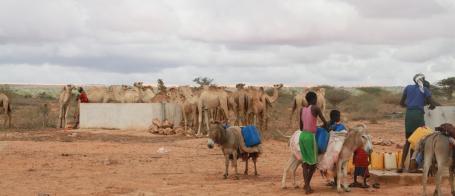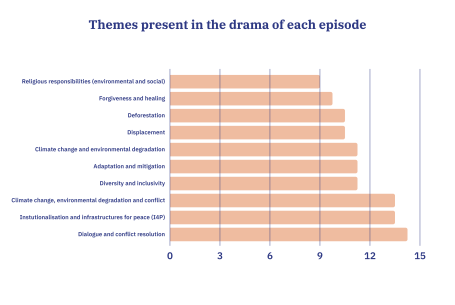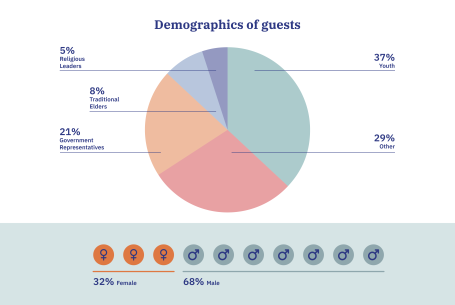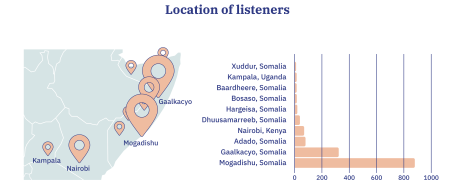How does a radio programme promote climate resilience and peacebuilding in Somalia?

Somalia
Few countries in the world are experiencing the impact of climate change like Somalia. In recent years, increased frequency and intensity of droughts, floods, and other extreme weather events have severely affected the livelihoods of people in Galmudug state in central Somalia, which largely depend on pastoralism and agriculture. Meanwhile, growing competition over depleting natural resources, such as pastures and water, has exacerbated ongoing conflicts and significantly increased the likelihood of violence in the area. To cope, many get involved in the charcoal trade, which further degrades the environment, contributes to insecurity throughout Somalia and provides a major source of funding for armed groups.
Some of the main problems include violent conflicts among nomads during the rainy season. When it rains in a location, nomads move there with their animals, and violence occurs, which needs to be resolved. They need intervention and awareness programmes because the conflicts are exacerbated by climate change.
Nurdin Sayid Hashi, radio programme listener
What does an integrated climate, peace and security approach look like in practice?
Since 2021, the monthly radio programme Garasho-wadaag (‘Sharing of Knowledge’) has been amplifying the voices of local peacebuilders, experts, and communities as they share knowledge on the environment, climate change, and peace in Galmudug. The initiative is run by the Berghof Foundation, which sensed from previous work in the region that broader engagement in Somalia was needed. For this, Berghof turned to radio, which continues to be a popular medium in Somalia, especially in rural and remote areas. In Galmudug, Berghof also works on capacity development as well as various levels of dialogue and strategic networking among key community and government actors to strengthen community resilience and support conflict transformation.
Watch the interview with the radio programme host
for English subtitles, please click 'subtitles' on the bottom right hand side of the video
The effects of climate change exacerbate the main causes of violent conflicts… I believe that this programme has brought a lot of change to the social realities on the ground. Nowadays, it is easy to bring awareness programmes to people wherever they are through the internet and mobile phones.
Mukhtar Abdi Hussein, radio programme listener
Beyond raising listeners’ awareness, the programme encourages communities to actively engage in building and sustaining peace through transforming people’s relationships with one another and their natural environment.
This programme has done a lot in raising public awareness. Many people who used to fight over grazing lands and over water wells now let their animals graze and drink water together. When people see lost animals, they bring them back to the owners. They formed peacebuilding committees. Garasho-wadaag, which people in the rural areas of Galmudug listen to, has made a lot of contributions.
Abdifatah Abdullahi Hussein, radio programme listener

Image: Number of times a theme is present in the drama segment of each episode over 29 episodes of the programme
Garasho-wadaag airs live from a station in Galkayo and recordings are also broadcasted on three other radio stations throughout Galmudug. Each 90-minute episode begins with a 15-20-minute audio drama, Geedi and Gobaad, featuring a boy and his grandmother on their environmental peacebuilding journey. Acted and voiced by two peacebuilders from Galkayo, the drama series addresses current social, political, and environmental dynamics—such as elections, inter-clan violence, floods, or drought—by problematising and analysing these issues and exploring ways to address them, often by referencing religious guidance and traditional knowledge.
Somalis like storytelling and therefore the drama is designed to capture the topic of the day in an easy way. This has benefited many people.
Burhan Abdullahi Hashi, Moderator of the radio programme Garasho-wadaag, journalist and peace campaigner
When you listen to the drama story of Geedi and Gobaad, you will realize that conflicts could be best resolved through dialogue… I can confidently say that Garasho-wadaag is a very important programme for the community.
Maymun Ali Nur, Chairperson of Women’s Association in Galkayo, radio programme listener

Image: Demographics of the 48 guests on the radio programme (societal role and gender)
In April 2024, for instance, in response to rising inter-clan conflicts and revenge killings in Galmudug, the Geedi and Gobaad story explored themes of personal loss, trauma, and anger, drawing strength from religious obligations of forgiveness and healing. The programme moderator, Burhan Abdullahi, then engages with guests—typically community peacebuilders, elders, experts, and government representatives— unpacking the theme of the day. Listeners are encouraged to call in and share their feedback, perspectives, and questions.
The programme plays a vital role in the things... Our efforts are limited in the sense that we can only gather four to five people to discuss issues, whereas the programme uses mass media to convey the message. Therefore, it does the most important part of the work we do.
Nabadon Abdulqadir Ali Hashi, radio programme listener

Image: Locations with highest percentage of Facebook listeners (does not account for listeners who use traditional radio)
Over the last years, the programme has earned an enthusiastic base of listeners from Galmudug but also other parts of Somalia and the Somali diaspora. The programme is increasingly followed through a livestream on its Facebook page. The audio is also made accessible through popular podcast streaming apps. Since 2023, a similar programme in Hirshabelle State, Hiloow (‘Longing’), has also been gaining traction.
Both the radio and Facebook are important. Elders and many others listen to the programme on the radio. Please carry on and expand the Garasho-wadaag programme.
Nabadon Abdirahman Ahmed Karshe, Peacemaker and elder in the Mudug region
The overwhelmingly positive feedback from guests, callers, and social media prompted both programmes to adopt a bi-weekly schedule in 2024. The Berghof Foundation intends to further expand these radio programmes in the future to ensure that as many people as possible can be reached by those striving for peace and climate security.
This impact story was prepared by: Pascal Grimm, Mir Mubashir, Teresa Isabel Andion-Wessel (Berghof Foundation), Alexandra Steinkraus and Sinéad Barry (adelphi research)
Infographics designed by Odile Stabon
Share on

